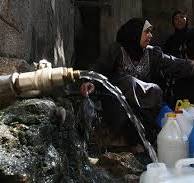In the Shadows of Survival: Salma’s Journey in South Gaza

In the Shadows of Survival: Salma’s Journey in South Gaza
The morning sun, pale and indifferent, begins to rise over the fragmented landscape of southern Gaza. Among the makeshift tents and scattered debris, Salma, a 34-year-old widow, starts her daily trek, a three-kilometer journey to fetch water for her family. The trail is fraught with challenges, both physical and emotional, each step echoing the losses and hardships that have defined her life since the onset of the conflict.
Salma’s story is one of countless others, etched into the sands of Gaza, each narrating a tale of resilience in the face of unimaginable adversity. Just months ago, Salma’s life was uprooted when an airstrike obliterated her home, claiming the life of her husband and leaving her and her five children to navigate the wreckage of their former lives.
Now, in the early hours of each day, Salma embarks on her grueling walk. The journey is a necessity; water is scarce, and the nearest supply is a long distance away. She strides with determination, carrying a heavy plastic container. The weight of the empty vessel symbolizes her burdens, but as she returns, the sloshing water within becomes a testament to her unyielding spirit.
“Every step I take is for my children,” Salma says, her voice a mixture of resolve and weariness. “I cannot afford to rest because they need me.”
Her day does not end with the acquisition of water. Upon her return, Salma must prepare a meager meal for her family. The kitchen is a rudimentary setup—an open space where she spends three hours daily collecting wood for the fire. The task is arduous and time-consuming, yet essential for cooking.
“I remember when cooking was a joy,” she reminisces. “We had a home, a stove, and my husband would play with the children as I prepared our meals. Now, everything is different.”
Salma’s five children, ranging in age from three to twelve, have been profoundly affected by the loss of their father and the destruction of their home. The youngest, Layla, clings to her mother’s leg, her wide eyes reflecting both fear and the comfort of her mother’s presence. The older children help where they can, but their lives are dominated by uncertainty and trauma.
Despite the devastating circumstances, Salma strives to maintain a semblance of normalcy. Education is sporadic, yet she encourages her children to read and write with the limited resources they have. “Knowledge is the one thing no one can take from us,” she insists.
In the evenings, the family gathers around the small fire Salma has painstakingly built. The flames cast flickering shadows, a fragile light in the darkness. Salma tells stories of their father, of happier times, trying to keep his memory alive for her children. Her voice, though tired, carries a strength born from love and an unwavering determination to survive.
The community around Salma is a mosaic of similar stories—families torn apart, homes reduced to rubble, and lives forever altered by the ongoing genocide. Yet, amidst the devastation, there is a profound sense of solidarity. Neighbors share what little they have, and collective efforts to rebuild, even in the smallest ways, are a testament to the resilience that binds them.
Aid organizations sporadically reach these areas, bringing temporary relief but not enough to meet all the needs. Salma is grateful for any assistance, but she knows that true change must come from a lasting peace and the ability to rebuild their lives on their own terms.
As the night deepens, Salma looks at her sleeping children, their faces peaceful in slumber despite the chaos surrounding them. She allows herself a moment of reflection, thinking of her husband and the life they once shared. Tears well in her eyes, but she quickly brushes them away. There is no room for despair; tomorrow will bring another three kilometers, another collection of wood, another day of survival.
“Hope keeps me going,” she whispers into the night. “For my children, for our future.”
Salma’s journey is far from over. Her path, marked by both sorrow and strength, is a testament to the indomitable human spirit. In the shadows of survival, she walks forward, each step a defiance against the forces that seek to break her, each act of daily resilience a beacon of hope for a future where her children might know peace.

